In Focus This Week
Lawmakers, Your Local Election Officials Would Like to Chat
New guide from NCSL and EAC can help make connections
By Katie King and Wendy Underhill
National Conference of State Legislatures
Voters are the most important people when it comes to elections: There’s no doubt about that. Legislators set election policy: There’s no doubt about that, either.
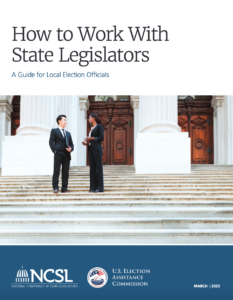 Then there are the advocacy groups asking either for more access or for more integrity—it’s hard to forget about them.
Then there are the advocacy groups asking either for more access or for more integrity—it’s hard to forget about them.
It can be easy, though, to overlook another key group: election administrators. County, city and town clerks, election directors, registrars of voters, auditors and probate judges all pay attention to the choices legislators make, because as policy goes, so goes their workload.
That means that in every state, there are at least some election officials who are laser-focused on legislative action.
The usual quip is that legislators know how to run for office, but that doesn’t mean they know how to run an election. That’s OK, though—knowing the folks who do have the expertise can be a boon.
“No one knows the needs of local election offices and the voters they serve better than local election officials,” says Christy McCormick, the chairwoman of the U.S. Election Assistance Commission, or EAC. “Their knowledge of election administration is an important resource when legislation impacting elections is considered.”
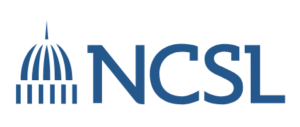 A new guide, “How to Work With State Legislatures,” gives election officials an overview of the legislative process, tips on how to build relationships with legislators, effective communication strategies and more. Created by the EAC and NCSL, the guide can help the officials who implement policy connect with the people who make it.
A new guide, “How to Work With State Legislatures,” gives election officials an overview of the legislative process, tips on how to build relationships with legislators, effective communication strategies and more. Created by the EAC and NCSL, the guide can help the officials who implement policy connect with the people who make it.
“We try to be present at the legislative committee that is hearing the bills so we can testify in person,” says Kathy Montejo, the city clerk and registrar of voters in Lewiston, Maine. Speaking for her state’s association of election officials, she adds that the “legislators have gotten to know us, and we have been able to establish a personal connection, which has developed the trust and respect they have for us and our insight and opinions.”
For election officials, attending hearings and being responsive is great; having a set of ready-to-go “asks” is even better.
 “When you’re going to see the legislative staff, or your members of the legislature, and you hand them a list of 25 or 50 things, they always ask, ‘What’s important to you?’” says David Stafford, the supervisor of elections in Escambia County, Fla., which includes Pensacola. “You start by ranking those things—which are the one or two most vital requests?”
“When you’re going to see the legislative staff, or your members of the legislature, and you hand them a list of 25 or 50 things, they always ask, ‘What’s important to you?’” says David Stafford, the supervisor of elections in Escambia County, Fla., which includes Pensacola. “You start by ranking those things—which are the one or two most vital requests?”
Engaging with legislators is good, but getting involved politically is a big no-no for most election officials. They know their lane: administering the laws in a nonpartisan manner. And they know lawmakers’ lane: making tough choices in a highly political world.
“Given our current environment, we really try not to get involved,” says Christina Tvedten, the elections manager in Ramsey County, Minn., which includes the state capital, St. Paul. “We are not partisan.” She speaks for her peers when she says, “Legislators can rely on the fact that the input received from us is not affected by partisan bias.”
For example, they can provide input on whether an idea will improve accuracy, reduce costs or speed up reporting.
All they ask is that they be consulted—and they believe sooner is better when it comes to weighing in on the unintended consequences and possible costs of doing things in a new way. When it comes to elections, talking to administrators can get you to win-win.
Katie King is a policy analyst in NCSL’s Elections and Redistricting Program; Wendy Underhill directs the program. This article first appeared in State Legislatures News. Anyone wishing to subscribe to NCSL’s Elections emails should contact Katie King at Katie.King@ncsl.org.
electionline Daily News Email
 What’s the best part of waking up? electionline Daily News in your inbox of course so be sure to sign up for your daily dose.
What’s the best part of waking up? electionline Daily News in your inbox of course so be sure to sign up for your daily dose.
Each morning you’ll receive the top headlines of the day, plus a listing of states featured in that day’s news round up.
To sign up, simply visit our site and provide us with your email and you’ll begin receiving the news in your inbox each morning.
We Google so you don’t have to!
Election News This Week
 2023 Elections: Elections were held throughout the country again this week including primary elections in New Jersey. It was a quiet day at the polls in the Garden State. According to the NJ Spotlight, a large percentage of voters took advance of early voting and vote-by-mail. More than 220,000 people used mail-in ballots and some 24,000 visited in-person voting centers Friday, Saturday and Sunday to cast ballots early on machines. While the number taking advantage of early in-person primary voting remained low, that turnout was about 20% higher than in 2021, when the governor’s race topped balloting in the first year it was offered. In Atlantic County voters had a first chance to use new polling machines purchased through a bond ordinance late last year. The new machines were used in all 151 voting districts during the primary election. “It’s easy, and it’s basically foolproof,” Valerie Tyrone told the Press of Atlantic City. Last year, Atlantic County commissioners voted to bond for $3.4 million to buy 325 new voting machines that include a paper audit trail. In Cascade County, Montana, voters headed to the polls for a library mill levy. Tuesday’s election marked the first with a court-ordered election monitor and reports are that things went well. According the Daily Montana, election judges and poll watchers working at the Montana ExpoPark report the process went smoother than the May 2 election, the first election for newly appointed Clerk and Recorder Sandra Merchant. Poll watcher Nancy Anderson attributed some of the course correction to the presence of Election Monitor Lynn DeRoche, who worked in the Elections Office more than 16 years with previous longtime Clerk Rina Moore, who was also present Tuesday as a poll watcher. “It’s smoother in some aspects because the ballots fit in the envelopes,” Anderson told the Daily Montanan with a chuckle, referencing one of the issues that plagued the May 2 election. “There are still some issues with people getting ballots that are not theirs.”
2023 Elections: Elections were held throughout the country again this week including primary elections in New Jersey. It was a quiet day at the polls in the Garden State. According to the NJ Spotlight, a large percentage of voters took advance of early voting and vote-by-mail. More than 220,000 people used mail-in ballots and some 24,000 visited in-person voting centers Friday, Saturday and Sunday to cast ballots early on machines. While the number taking advantage of early in-person primary voting remained low, that turnout was about 20% higher than in 2021, when the governor’s race topped balloting in the first year it was offered. In Atlantic County voters had a first chance to use new polling machines purchased through a bond ordinance late last year. The new machines were used in all 151 voting districts during the primary election. “It’s easy, and it’s basically foolproof,” Valerie Tyrone told the Press of Atlantic City. Last year, Atlantic County commissioners voted to bond for $3.4 million to buy 325 new voting machines that include a paper audit trail. In Cascade County, Montana, voters headed to the polls for a library mill levy. Tuesday’s election marked the first with a court-ordered election monitor and reports are that things went well. According the Daily Montana, election judges and poll watchers working at the Montana ExpoPark report the process went smoother than the May 2 election, the first election for newly appointed Clerk and Recorder Sandra Merchant. Poll watcher Nancy Anderson attributed some of the course correction to the presence of Election Monitor Lynn DeRoche, who worked in the Elections Office more than 16 years with previous longtime Clerk Rina Moore, who was also present Tuesday as a poll watcher. “It’s smoother in some aspects because the ballots fit in the envelopes,” Anderson told the Daily Montanan with a chuckle, referencing one of the issues that plagued the May 2 election. “There are still some issues with people getting ballots that are not theirs.”
 Voting Rights: The Associated Press, this week, released a series of stories about the historical struggle for voting rights and how those involved in the fight see the struggle today. According to the AP, the stories from those on the front lines of history recount tragedy, racism, oppression and ultimately hope in seeing a president sign into law a measure designed to ensure equal access to the ballot and fair representation in the halls of political power — from city councils to statehouses to Congress. The stories include those of Stephen Schwerner whose brother was murdered trying to register Black voter in Mississippi, Luci Johnson, daughter of President Lyndon B. Johnson who signed the Voting Rights Act into law, Della Simpson Maynor, who as a teenager was assaulted by police during a civil rights protest in Alabama and Andrew Young, whose first thought when he heard the Voting Rights Act was signed into law wasn’t celebratory, but strategic. “Where are we going to get the money to get the country mobilized to register these voters?” he told the AP while thinking at that momentous time nearly 60 years ago.
Voting Rights: The Associated Press, this week, released a series of stories about the historical struggle for voting rights and how those involved in the fight see the struggle today. According to the AP, the stories from those on the front lines of history recount tragedy, racism, oppression and ultimately hope in seeing a president sign into law a measure designed to ensure equal access to the ballot and fair representation in the halls of political power — from city councils to statehouses to Congress. The stories include those of Stephen Schwerner whose brother was murdered trying to register Black voter in Mississippi, Luci Johnson, daughter of President Lyndon B. Johnson who signed the Voting Rights Act into law, Della Simpson Maynor, who as a teenager was assaulted by police during a civil rights protest in Alabama and Andrew Young, whose first thought when he heard the Voting Rights Act was signed into law wasn’t celebratory, but strategic. “Where are we going to get the money to get the country mobilized to register these voters?” he told the AP while thinking at that momentous time nearly 60 years ago.
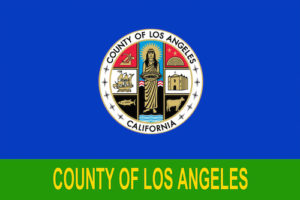 Congratulations: Congratulations to the Los Angeles County Registrar-Recorder/County Clerk’s office for being honored with 11 (!) National Association of Counties (NACo) Achievement Awards. Eleven! “It is an honor to receive 11 NACo Achievement Awards and this recognition underscores the efforts and commitment of our exceptional team to improving essential public services,” said Registrar-Recorder/County Clerk Dean Logan. “These awards inspire us to continue pushing boundaries and setting new benchmarks in delivering innovative and impactful solutions to residents throughout the County. The categories in which the RR/CC received awards highlight the diverse range of contributions to serve Los Angeles County residents including: Personnel Management, Employment, and Training, Civic Education and Public Information and Information Technology. The NACo Achievement Awards program highlights the innovative solutions and exemplary work of county governments across the country.
Congratulations: Congratulations to the Los Angeles County Registrar-Recorder/County Clerk’s office for being honored with 11 (!) National Association of Counties (NACo) Achievement Awards. Eleven! “It is an honor to receive 11 NACo Achievement Awards and this recognition underscores the efforts and commitment of our exceptional team to improving essential public services,” said Registrar-Recorder/County Clerk Dean Logan. “These awards inspire us to continue pushing boundaries and setting new benchmarks in delivering innovative and impactful solutions to residents throughout the County. The categories in which the RR/CC received awards highlight the diverse range of contributions to serve Los Angeles County residents including: Personnel Management, Employment, and Training, Civic Education and Public Information and Information Technology. The NACo Achievement Awards program highlights the innovative solutions and exemplary work of county governments across the country.
 Sticker News: Congratulations to two students and two residents for winning the Adams County, Colorado “I Voted” sticker contest. “Congratulations to our design contest winners,” said Josh Zygielbaum, Adams County Clerk & Recorder. “Their creativity and enthusiasm are an inspiration, and I hope these fun new designs will encourage all Adams County voters to get out and vote in the upcoming 2023 and 2024 elections.” Thirty-six entries from students and residents submitted their design ideas to the Adams County Elections Department for the I-Voted Sticker Design Contest. Adams County voters will receive an “I Voted” sticker in English and Spanish with their ballot packets, but if they want to collect them all, they can stop by the county’s Voter Service Center. A fifth sticker was chosen by the staff to be distributed at the elections team booth during the county’s Pride celebrations.
Sticker News: Congratulations to two students and two residents for winning the Adams County, Colorado “I Voted” sticker contest. “Congratulations to our design contest winners,” said Josh Zygielbaum, Adams County Clerk & Recorder. “Their creativity and enthusiasm are an inspiration, and I hope these fun new designs will encourage all Adams County voters to get out and vote in the upcoming 2023 and 2024 elections.” Thirty-six entries from students and residents submitted their design ideas to the Adams County Elections Department for the I-Voted Sticker Design Contest. Adams County voters will receive an “I Voted” sticker in English and Spanish with their ballot packets, but if they want to collect them all, they can stop by the county’s Voter Service Center. A fifth sticker was chosen by the staff to be distributed at the elections team booth during the county’s Pride celebrations.
Personnel News: Lynne Weaver has resigned from the Baxter County, Arkansas election commission. Tina Harris has been sworn in as the new Larimer County, Colorado clerk and recorder. Ingham County, Michigan Clerk Barb Byrum has announced her re-election campaign. Maricopa County Supervisor Bill Gates announced that he will not seek re-election in 2024. Eric Olsen has been reappointed to the position of director of elections for Prince William County, Virginia. Dele Lowman-Smith has stepped down from the DeKalb County, Illinois board of registration and elections. Olivia Chapman has been hired as the new Bryan County, Georgia elections supervisor. Jess Bradfield has resigned as the Cache County, Utah clerk/auditor. Tom Gillon is the new Macon-Bibb, Georgia election supervisor. Vernetta Nuriddin, former vice chair of the Fulton County, Georgia Board of Registration and Elections, has been hired as the elections consultant for Milton’s municipal general elections this year. David Whipple has been appointed interim auditor in Warren County, Iowa. Melanie Howell is the new Lincoln County, Montana elections administrator. Ryan Sullivan is the new Washington County, Utah clerk/auditor. State Sen. Denny Hoskins (R) has announced his candidacy for Missouri secretary of state. The Fulton County, Georgia board of commissioners voted to appoint Mike Heekin to the county board of registration of elections and reappoint Teresa Smith Crawford and Aaron Johnson. Fountain Hills, Arizona Clerk Linda Mendenhall has been named to the 2023 Municipal Clerks Honor Roll.
Legislative Updates
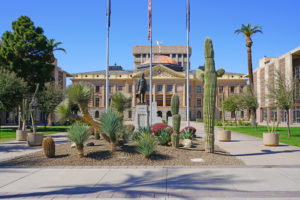 Arizona: Gov. Katie Hobbs (D) has vetoed Senate Bill 1265, which would have outlawed the use of ranked-choice voting throughout Arizona, despite the fact that it currently doesn’t exist anywhere in the state. The bill was a preemptive prohibition from a cadre of Republican lawmakers who are vehemently opposed to the voting style’s possible placement on the 2024 ballot. An identical version of the bill was already vetoed in April.
Arizona: Gov. Katie Hobbs (D) has vetoed Senate Bill 1265, which would have outlawed the use of ranked-choice voting throughout Arizona, despite the fact that it currently doesn’t exist anywhere in the state. The bill was a preemptive prohibition from a cadre of Republican lawmakers who are vehemently opposed to the voting style’s possible placement on the 2024 ballot. An identical version of the bill was already vetoed in April.
Hobbs also vetoed Senate Bill 1201, which would have prohibited election officials from using voter signatures in e-pollbooks — used when voters sign into a polling place or voting center — to verify signatures on early ballots.
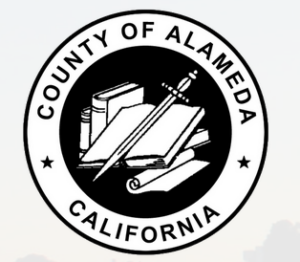 Alameda County, California: The Alameda County board of supervisors voted this week to establish a 13-member elections commission to oversee federal, state and local elections in the county. The commission, which is scheduled to be seated by August, will make sure the registrar of voters is functioning transparently and accurately. Supervisor Keith Carson wrote the legislation creating the commission following the November 2022 General Election, which was marred by several serious mistakes made by Registrar Tim Dupuis and his team including incorrectly tabulated ballots in ranked-choice contests in Oakland, Berkeley, and San Leandro. The new commission is designed to address many of these problems, mainly by requiring the registrar to present the oversight board with its plan in advance of each election. The commission will give the registrar feedback on the plan—including voter education, outreach, language access, and technical issues, including how ballots are counted. The commission will also conduct post-election assessments and report to the Board of Supervisors.
Alameda County, California: The Alameda County board of supervisors voted this week to establish a 13-member elections commission to oversee federal, state and local elections in the county. The commission, which is scheduled to be seated by August, will make sure the registrar of voters is functioning transparently and accurately. Supervisor Keith Carson wrote the legislation creating the commission following the November 2022 General Election, which was marred by several serious mistakes made by Registrar Tim Dupuis and his team including incorrectly tabulated ballots in ranked-choice contests in Oakland, Berkeley, and San Leandro. The new commission is designed to address many of these problems, mainly by requiring the registrar to present the oversight board with its plan in advance of each election. The commission will give the registrar feedback on the plan—including voter education, outreach, language access, and technical issues, including how ballots are counted. The commission will also conduct post-election assessments and report to the Board of Supervisors.
 Connecticut: Governor Ned Lamont has signed a law creating an early voting system in Connecticut. The legislation, known as Public Act 23-5, will impact general elections, special elections and primaries in the state. It was passed in the Senate on June 1 with a 27 to 7 vote, and it passed in the House of Representatives with a 107 to 35 vote. The bill gives Connecticut voters 14 days to cast their general election ballots early and in-person. Every town in the state will now be required to establish at least one early voting location beginning Jan. 1, 2024. It also allows seven early voting days for most primaries and four for presidential primaries and special elections. “There are 46 other states that already have early voting and I’m glad that Connecticut is finally joining them and giving our voters this option. This will help improve the ability of voters to cast their ballots and enable more people to participate in our democracy,” Lamont said on Twitter.
Connecticut: Governor Ned Lamont has signed a law creating an early voting system in Connecticut. The legislation, known as Public Act 23-5, will impact general elections, special elections and primaries in the state. It was passed in the Senate on June 1 with a 27 to 7 vote, and it passed in the House of Representatives with a 107 to 35 vote. The bill gives Connecticut voters 14 days to cast their general election ballots early and in-person. Every town in the state will now be required to establish at least one early voting location beginning Jan. 1, 2024. It also allows seven early voting days for most primaries and four for presidential primaries and special elections. “There are 46 other states that already have early voting and I’m glad that Connecticut is finally joining them and giving our voters this option. This will help improve the ability of voters to cast their ballots and enable more people to participate in our democracy,” Lamont said on Twitter.
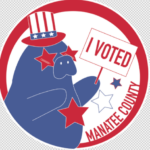 Manatee County, Florida: Leaders in Manatee County unanimously passed a new rule allowing concealed weapons in government workplaces on Tuesday. It includes any building or vehicle the county owns, operates, or any place where a Manatee County employee is conducting county business. But there are exceptions — you cannot carry a weapon in courthouses, courtrooms, polling places, or any schools, even if you’re an employee. The county will also not allow an employee to openly carry a gun in public.
Manatee County, Florida: Leaders in Manatee County unanimously passed a new rule allowing concealed weapons in government workplaces on Tuesday. It includes any building or vehicle the county owns, operates, or any place where a Manatee County employee is conducting county business. But there are exceptions — you cannot carry a weapon in courthouses, courtrooms, polling places, or any schools, even if you’re an employee. The county will also not allow an employee to openly carry a gun in public.
 Minnesota: The law restoring voting rights to Minnesotans who have left prison behind tooke effect today, June 1. All Minnesotans who are not currently incarcerated for a felony conviction are now eligible and able to register to vote. Minnesota Secretary Steve Simon joined Restore the Vote advocates today to register the very first newly eligible Minnesotans. The voters completed their voter registration forms and Simon handed them an “I Will Vote” sticker. “Today is a victory for voting rights and for Minnesota. Expanding our democracy to tens of thousands of Minnesotans who have left prison behind will only make it stronger,” said Simon. “But we can’t walk away after this victory, we have to hit the ground running to get our newly eligible neighbors registered and participating in our democracy.” With at least 55,000 Minnesotans being newly enfranchised, the newly effective law marks the largest expansion of voting rights since the voting age in Minnesota was lowered to 18.
Minnesota: The law restoring voting rights to Minnesotans who have left prison behind tooke effect today, June 1. All Minnesotans who are not currently incarcerated for a felony conviction are now eligible and able to register to vote. Minnesota Secretary Steve Simon joined Restore the Vote advocates today to register the very first newly eligible Minnesotans. The voters completed their voter registration forms and Simon handed them an “I Will Vote” sticker. “Today is a victory for voting rights and for Minnesota. Expanding our democracy to tens of thousands of Minnesotans who have left prison behind will only make it stronger,” said Simon. “But we can’t walk away after this victory, we have to hit the ground running to get our newly eligible neighbors registered and participating in our democracy.” With at least 55,000 Minnesotans being newly enfranchised, the newly effective law marks the largest expansion of voting rights since the voting age in Minnesota was lowered to 18.
 Nebraska: LB 514 gained final approval in the Legislature. LB 514, which implements voter ID in Nebraska, following voter approval of a state constitutional amendment in 2022 requiring voters to show a photo ID. The bill overcame a one-woman filibuster by Dunbar Sen. Julie Slama, who was pushing for a “more conservative vision” of voter ID. Gordon Sen. Tom Brewer, who chairs the Government, Military and Veterans Affairs Committee, said the panel picked the “narrower, more focused” approach on voter ID when no compromise could be found between Slama and Nebraska Secretary of State Bob Evnen. LB 514 requires voters to show ID when voting in person. It makes exceptions for religious objectors to being photographed and people with disabilities.
Nebraska: LB 514 gained final approval in the Legislature. LB 514, which implements voter ID in Nebraska, following voter approval of a state constitutional amendment in 2022 requiring voters to show a photo ID. The bill overcame a one-woman filibuster by Dunbar Sen. Julie Slama, who was pushing for a “more conservative vision” of voter ID. Gordon Sen. Tom Brewer, who chairs the Government, Military and Veterans Affairs Committee, said the panel picked the “narrower, more focused” approach on voter ID when no compromise could be found between Slama and Nebraska Secretary of State Bob Evnen. LB 514 requires voters to show ID when voting in person. It makes exceptions for religious objectors to being photographed and people with disabilities.
 New York: New York lawmakers want to move the upcoming 2024 presidential primary to April 2, earlier than the last two primaries in 2016 and 2020. Assembly Speaker Carl Heastie (D-Bronx) and state Senate Majority Leader Andrea Stewart Cousins (D-Yonkers) are co-sponsors of the legislation to formalize New York’s April 2 primary date. Neighboring Connecticut and Pennsylvania are also reportedly considering holding their primaries on April 2.
New York: New York lawmakers want to move the upcoming 2024 presidential primary to April 2, earlier than the last two primaries in 2016 and 2020. Assembly Speaker Carl Heastie (D-Bronx) and state Senate Majority Leader Andrea Stewart Cousins (D-Yonkers) are co-sponsors of the legislation to formalize New York’s April 2 primary date. Neighboring Connecticut and Pennsylvania are also reportedly considering holding their primaries on April 2.
Advocates for several bills that would make it easier to vote in New York state are viewing the waning days of the 2023 legislative session with a mixture of hope and frustration. One bill would require ballot measures to be written in plain English. One bill would permit voters standing in line on Election Day to receive food or water from someone else while they wait, which is currently illegal in New York. A third bill would make permanent a pandemic-era law that allowed voters to request absentee ballots if they were worried about catching or transmitting an illness.
Lawmakers are expected to pass a bill this week consolidating many town- and county-level elections to even-numbered years. Assemblymember Amy Paulin (D-Westchester County) and Sen. James Skoufis (D-Orange County) announced that their bill would come to a vote before lawmakers end their legislative session in Albany later this week. The measure, the Democratic lawmakers argue, would help boost voter turnout in local elections by aligning them with state and national elections — such as those for governor or president, which draw far more voters than local-only elections in odd years. If it is signed by Gov. Kathy Hochul, the measure would be gradually phased in over a period of years. It would apply to offices like county executive and town supervisor, for which elections in many localities are held in odd-numbered years, opposite the presidential and statewide elections. But it would not apply to certain positions like district attorney and city-level elections — which are set by the state constitution.
 North Carolina: Republican lawmakers are proposing a sweeping package of changes to state election laws ahead of the 2024 elections — including throwing out any mail-in ballots not received by Election Night, instead of the current three-day grace period after the election. Senate Bill 747 also proposes more restrictions on mail-in voting, a ban on counties receiving grants to help fund elections, changes to the rules for same-day voter registration, a rule to make it easier for people to formally accuse others of voter fraud, and more. The proposal also requires elections boards to acquire and use signature verification software for absentee ballots. It would require signature verifications for mail-in ballots — in addition to the current rules that also require two witnesses. And it makes it easier to remove people from voting lists if they’ve claimed they aren’t a citizen to get out of jury duty. Some of the changes proposed have been proposed in the past, only to be vetoed by Democratic Gov. Roy Cooper. Others are new ideas.
North Carolina: Republican lawmakers are proposing a sweeping package of changes to state election laws ahead of the 2024 elections — including throwing out any mail-in ballots not received by Election Night, instead of the current three-day grace period after the election. Senate Bill 747 also proposes more restrictions on mail-in voting, a ban on counties receiving grants to help fund elections, changes to the rules for same-day voter registration, a rule to make it easier for people to formally accuse others of voter fraud, and more. The proposal also requires elections boards to acquire and use signature verification software for absentee ballots. It would require signature verifications for mail-in ballots — in addition to the current rules that also require two witnesses. And it makes it easier to remove people from voting lists if they’ve claimed they aren’t a citizen to get out of jury duty. Some of the changes proposed have been proposed in the past, only to be vetoed by Democratic Gov. Roy Cooper. Others are new ideas.
Legislation has been introduced that would call for a special election if a legislator switches parties. The bill introduced by Democrats today is called the Voter Fraud Protection Act. It works under two parts. The first part of the bill says if an elected legislator switches parties with six months or more left in their term, they vacate their seat and a special election has to be held. Lawmakers behind the bill say that would give voters the chance to support the legislator in question in their new party or elect someone new. The second part of the bill says if a legislator switches parties, donors can request a refund and the legislator will be required to return money donated to their campaign under the party they switched from.
 Pennsylvania: By a series of party-line votes, the House State Government Committee approved 12 resolutions this week including one that would authorize two legislative studies on voting. House Resolution 32 directing a study by the Joint State Government Commission of how polling places, voting machines and poll workers can be deployed with the goal of reducing the time it takes to vote and House Resolution 47 directing the commission to study issues surrounding how Pennsylvanians formerly incarcerated for felonies can reassert their voting rights. Rep. Joe Webster, D-Montgomery, sponsor of HR32, said recent elections have shown the need for the study especially with many poll workers leaving. Rep. Carol Kazeem, D-Chester, sponsor of HR47, said state law allows Pennsylvanians who have served a felony sentence to regain the right to vote, but many are not aware of that right.
Pennsylvania: By a series of party-line votes, the House State Government Committee approved 12 resolutions this week including one that would authorize two legislative studies on voting. House Resolution 32 directing a study by the Joint State Government Commission of how polling places, voting machines and poll workers can be deployed with the goal of reducing the time it takes to vote and House Resolution 47 directing the commission to study issues surrounding how Pennsylvanians formerly incarcerated for felonies can reassert their voting rights. Rep. Joe Webster, D-Montgomery, sponsor of HR32, said recent elections have shown the need for the study especially with many poll workers leaving. Rep. Carol Kazeem, D-Chester, sponsor of HR47, said state law allows Pennsylvanians who have served a felony sentence to regain the right to vote, but many are not aware of that right.
 Harris County, Texas: The Harris County Commissioners Court voted to give the county attorney the green light to sue the state of Texas over two election bills. Both bills target elections in Harris County alone and were passed by state lawmakers this year. However, the county attorney cannot take legal action until Gov. Greg Abbott signs the bills into law. SB 1750 would eliminate the appointed election administrator position and transfer duties back to the two elected county leaders that previously handled them. SB 1933 gives the Texas Secretary of State the authority to investigate election “irregularities” if complaints are filed. Pct. 3 Commissioner Tom Ramsey was the only one to vote against allowing the county attorney to file a lawsuit. The vote followed 45 minutes of discussions behind closed doors and two speakers who spoke against the lawsuit.
Harris County, Texas: The Harris County Commissioners Court voted to give the county attorney the green light to sue the state of Texas over two election bills. Both bills target elections in Harris County alone and were passed by state lawmakers this year. However, the county attorney cannot take legal action until Gov. Greg Abbott signs the bills into law. SB 1750 would eliminate the appointed election administrator position and transfer duties back to the two elected county leaders that previously handled them. SB 1933 gives the Texas Secretary of State the authority to investigate election “irregularities” if complaints are filed. Pct. 3 Commissioner Tom Ramsey was the only one to vote against allowing the county attorney to file a lawsuit. The vote followed 45 minutes of discussions behind closed doors and two speakers who spoke against the lawsuit.
 Utah: According to KSL-TV, Utah’s House Majority Leader, Rep. Mike Schultz, R- Hooper, is signaling the Utah legislature may shorten the state’s special election law timeline so Utah’s soon-to-be vacant 2nd District Congressional seat can be filled in four months instead of six. That would require a special session, which either Gov. Cox or lawmakers can call. Schultz said he didn’t believe lawmakers would call themselves. Right now, Utah law stipulates that 180 days, or about six months, are needed to complete the special primary and general election schedules. This reflects the requirement that there are 90 days between the date Gov. Cox schedules the election and the primary. The law also requires that another 90 days must separate the primary and the general elections. The law also requires special elections be held on certain existing election days, unless the legislature gives money to change the dates. As it stands now, the earliest date the general election can be held in March of 2024 unless the legislature steps in.
Utah: According to KSL-TV, Utah’s House Majority Leader, Rep. Mike Schultz, R- Hooper, is signaling the Utah legislature may shorten the state’s special election law timeline so Utah’s soon-to-be vacant 2nd District Congressional seat can be filled in four months instead of six. That would require a special session, which either Gov. Cox or lawmakers can call. Schultz said he didn’t believe lawmakers would call themselves. Right now, Utah law stipulates that 180 days, or about six months, are needed to complete the special primary and general election schedules. This reflects the requirement that there are 90 days between the date Gov. Cox schedules the election and the primary. The law also requires that another 90 days must separate the primary and the general elections. The law also requires special elections be held on certain existing election days, unless the legislature gives money to change the dates. As it stands now, the earliest date the general election can be held in March of 2024 unless the legislature steps in.
 Wisconsin: The Assembly committee in charge of elections began hearing testimony on four bills that are part of a bipartisan package to change election rules in response to recent controversies. One bill would prohibit a municipality from closing more than half of its polling places within 30 days of an election. It would also prevent a municipality from closing any polling place within 30 days without gaining approval from the local governing leader and clerk and allowing the public to weigh in. A potential amendment to the bill would require the entire city council to vote on a polling place closure. Another bill would require the Wisconsin Elections Commission to repay local governments for certain costs involved with administering special elections, such as open Assembly and Senate seats. Another bill would require municipalities that broadcast canvassing proceedings on election night to save the recording for 22 months. Democratic Gov. Tony Evers vetoed a similar bill in 2021, arguing communities that want to promote transparency should not be burdened with the requirement. The last bill would require military voters to provide their Department of Defense number when requesting an absentee ballot. The clerk would verify the number and the voter would complete an additional consent form to release information.
Wisconsin: The Assembly committee in charge of elections began hearing testimony on four bills that are part of a bipartisan package to change election rules in response to recent controversies. One bill would prohibit a municipality from closing more than half of its polling places within 30 days of an election. It would also prevent a municipality from closing any polling place within 30 days without gaining approval from the local governing leader and clerk and allowing the public to weigh in. A potential amendment to the bill would require the entire city council to vote on a polling place closure. Another bill would require the Wisconsin Elections Commission to repay local governments for certain costs involved with administering special elections, such as open Assembly and Senate seats. Another bill would require municipalities that broadcast canvassing proceedings on election night to save the recording for 22 months. Democratic Gov. Tony Evers vetoed a similar bill in 2021, arguing communities that want to promote transparency should not be burdened with the requirement. The last bill would require military voters to provide their Department of Defense number when requesting an absentee ballot. The clerk would verify the number and the voter would complete an additional consent form to release information.
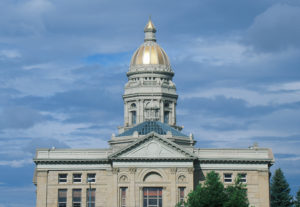 Wyoming: Sen. Cale Case, R-Lander, thinks poll watchers should be able to observe vote counting. The Joint Corporations, Elections and Political Subdivisions held its first of six scheduled meetings last week “In other states, there have been issues of poll watchers interacting with voters, and there’s at least a couple of complaints in Wyoming about this that I’ve become aware of,” committee Co-Chair Case said. “Some states prohibit poll watchers from being within a certain distance of a voter, some prohibit them from talking to a voter. So, where are we on that?” Both parties instruct poll watchers not to challenge voters, Platte County Clerk and County Clerks’ Association of Wyoming President Malcolm Ervin said. He also said it’s especially helpful when complaints of voters being challenged are made early enough that county clerks can address and stop it. “I wouldn’t say that issue was pervasive, but present,” Ervin said. Case also said it may be worthwhile to have independent observers in the room as ballots are counted, so long as those observers do not interfere with the ballot counting process. “It seems to me I could make an argument that’s a time where you ought to be able to have observers that are not interfering with the people to watch that situation,” he said.
Wyoming: Sen. Cale Case, R-Lander, thinks poll watchers should be able to observe vote counting. The Joint Corporations, Elections and Political Subdivisions held its first of six scheduled meetings last week “In other states, there have been issues of poll watchers interacting with voters, and there’s at least a couple of complaints in Wyoming about this that I’ve become aware of,” committee Co-Chair Case said. “Some states prohibit poll watchers from being within a certain distance of a voter, some prohibit them from talking to a voter. So, where are we on that?” Both parties instruct poll watchers not to challenge voters, Platte County Clerk and County Clerks’ Association of Wyoming President Malcolm Ervin said. He also said it’s especially helpful when complaints of voters being challenged are made early enough that county clerks can address and stop it. “I wouldn’t say that issue was pervasive, but present,” Ervin said. Case also said it may be worthwhile to have independent observers in the room as ballots are counted, so long as those observers do not interfere with the ballot counting process. “It seems to me I could make an argument that’s a time where you ought to be able to have observers that are not interfering with the people to watch that situation,” he said.
Legal Updates
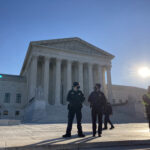 U.S. Supreme Court: The Supreme Court ordered Alabama officials to redraw the state’s congressional map to allow an additional Black majority district to account for the fact that the state is 27% Black. The decision – that affords additional opportunities for minority voters to elect the candidate of their choice – comes as a surprise given the conservative majority on the court. The opinion was 5-4. The decision was released at press time. We’ll have more next week.
U.S. Supreme Court: The Supreme Court ordered Alabama officials to redraw the state’s congressional map to allow an additional Black majority district to account for the fact that the state is 27% Black. The decision – that affords additional opportunities for minority voters to elect the candidate of their choice – comes as a surprise given the conservative majority on the court. The opinion was 5-4. The decision was released at press time. We’ll have more next week.
 Arizona: The Arizona Supreme Court rejected arguments by state Rep. Alexander Kolodin (R-Scottsdale) that allowing people to fill out their ballots at their kitchen tables — or anywhere else — runs afoul of a constitutional provision that requires “secrecy in voting shall be preserved.” There was no explanation of the decision. But in refusing to consider the arguments he presented for the state GOP, the justices left intact an earlier decision by the state Court of Appeals that there are sufficient safeguards built into Arizona law to ensure that each voter’s choices are kept confidential. The decision is the last legal gasp for the party, as there is no basis to seek review by the U.S. Supreme Court. Arizona has had some form of early voting almost since the first days of statehood. But that was limited to special circumstances, ranging from military serving overseas to people who were incapacitated. In 1991, however, state lawmakers approved no-excuse early voting, allowing anyone to request a ballot be sent to them which they can fill out at home — or anywhere — and either return it by mail, put in a drop box or take directly to a polling location. Kolodin, in seeking to have the Supreme Court void on-demand early ballots, did not discuss the election results. Instead, he focused on that constitutional requirement “that secrecy in voting shall be preserved.” Strictly speaking, Kolodin was not arguing that people can’t have a ballot sent to them by mail. What he told the justices, though, is that the constitutionally mandated secrecy can be maintained only if an official is present when someone actually casts a ballot — even from their own kitchen — and that the official “then watches the voter enclose and seal the ballot in an envelope.” Kolodin said that can’t happen if someone is filling out a ballot at a kitchen table and sealing it there.
Arizona: The Arizona Supreme Court rejected arguments by state Rep. Alexander Kolodin (R-Scottsdale) that allowing people to fill out their ballots at their kitchen tables — or anywhere else — runs afoul of a constitutional provision that requires “secrecy in voting shall be preserved.” There was no explanation of the decision. But in refusing to consider the arguments he presented for the state GOP, the justices left intact an earlier decision by the state Court of Appeals that there are sufficient safeguards built into Arizona law to ensure that each voter’s choices are kept confidential. The decision is the last legal gasp for the party, as there is no basis to seek review by the U.S. Supreme Court. Arizona has had some form of early voting almost since the first days of statehood. But that was limited to special circumstances, ranging from military serving overseas to people who were incapacitated. In 1991, however, state lawmakers approved no-excuse early voting, allowing anyone to request a ballot be sent to them which they can fill out at home — or anywhere — and either return it by mail, put in a drop box or take directly to a polling location. Kolodin, in seeking to have the Supreme Court void on-demand early ballots, did not discuss the election results. Instead, he focused on that constitutional requirement “that secrecy in voting shall be preserved.” Strictly speaking, Kolodin was not arguing that people can’t have a ballot sent to them by mail. What he told the justices, though, is that the constitutionally mandated secrecy can be maintained only if an official is present when someone actually casts a ballot — even from their own kitchen — and that the official “then watches the voter enclose and seal the ballot in an envelope.” Kolodin said that can’t happen if someone is filling out a ballot at a kitchen table and sealing it there.
 Michigan: The City of Ypsilanti is planning to fight a lawsuit that was brought against it. The suit claims an ordinance requiring landlords to distribute voting information is unconstitutional. The ordinance, which is currently suspended as a result of the litigation, says all landlords must include information about voting in a tenant’s move-in packet. That includes materials provided by the city about absentee ballots, polling locations, and a voter registration form. John Barr is the Ypsilanti city attorney, and he said the case was referred to the city insurance company and they’ve picked up the defense. According to the law firm representing the five landlords who filed the suit, the ordinance is a violation of the First Amendment because it’s compelled speech.
Michigan: The City of Ypsilanti is planning to fight a lawsuit that was brought against it. The suit claims an ordinance requiring landlords to distribute voting information is unconstitutional. The ordinance, which is currently suspended as a result of the litigation, says all landlords must include information about voting in a tenant’s move-in packet. That includes materials provided by the city about absentee ballots, polling locations, and a voter registration form. John Barr is the Ypsilanti city attorney, and he said the case was referred to the city insurance company and they’ve picked up the defense. According to the law firm representing the five landlords who filed the suit, the ordinance is a violation of the First Amendment because it’s compelled speech.
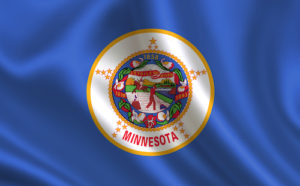 Minnesota: The Minnesota Supreme Court upheld a Hennepin County District Court ruling prohibiting the placement of a Bloomington Charter amendment by residents seeking a second vote on ranked-choice voting. There will be no change in November’s municipal elections, the city announced following the Supreme Court ruling. Six justices wrote the majority opinion that held the district court and the city properly declined to place the entire proposed charter amendment on the ballot and that it would be improper for the court to sever or remove an unconstitutional provision because it was integral to the purpose of the amendment, according to the city. The original charter amendment petition was filed in June 2022 by representatives of Residents for a Better Bloomington, which describes itself as a nonpartisan grassroots watchdog group serving the residents of Bloomington. The petition asked for a second vote on ranked-choice voting last November, asking to repeal the system instituted in 2021 for Bloomington City Council elections and to establish a two-thirds voter approval of any new effort to establish ranked-choice voting for city elections. The Supreme Court said that the purpose of the proposed amendment was clearly two-fold, to repeal ranked-choice voting and prevent it from being reinstated in future elections, according to the city’s announcement. “Given the importance of the unconstitutional provision, the court was unable to conclude that the residents of Bloomington who supported and signed the petition would have done so if the proposal did not include the severed provision.”
Minnesota: The Minnesota Supreme Court upheld a Hennepin County District Court ruling prohibiting the placement of a Bloomington Charter amendment by residents seeking a second vote on ranked-choice voting. There will be no change in November’s municipal elections, the city announced following the Supreme Court ruling. Six justices wrote the majority opinion that held the district court and the city properly declined to place the entire proposed charter amendment on the ballot and that it would be improper for the court to sever or remove an unconstitutional provision because it was integral to the purpose of the amendment, according to the city. The original charter amendment petition was filed in June 2022 by representatives of Residents for a Better Bloomington, which describes itself as a nonpartisan grassroots watchdog group serving the residents of Bloomington. The petition asked for a second vote on ranked-choice voting last November, asking to repeal the system instituted in 2021 for Bloomington City Council elections and to establish a two-thirds voter approval of any new effort to establish ranked-choice voting for city elections. The Supreme Court said that the purpose of the proposed amendment was clearly two-fold, to repeal ranked-choice voting and prevent it from being reinstated in future elections, according to the city’s announcement. “Given the importance of the unconstitutional provision, the court was unable to conclude that the residents of Bloomington who supported and signed the petition would have done so if the proposal did not include the severed provision.”
 Mississippi: The American Civil Liberties Union announced that they have joined a collection of advocacy groups across the state to challenge Senate Bill 2358. They join the Southern Poverty Law Center (SPLC), Mississippi Center for Justice, ACLU-MS and Disability Rights Mississippi (DRMS). The plaintiffs are listed as DRMS, the League of Women Voters of Mississippi, and three Mississippi voters. The bill was signed by the governor this year and blocks anyone from assisting a Mississippi voter with their ballot unless they are: An election official; A postal worker; or A family member or caregiver. The ACLU released a statement this week that says the term “caregiver” is not adequately defined, meaning that nursing home attendants and other healthcare institution workers could be liable should they aid patients with voting. Author of the bill, state Senator Jeff Tate, claims it would prevent “ballot harvesting.”
Mississippi: The American Civil Liberties Union announced that they have joined a collection of advocacy groups across the state to challenge Senate Bill 2358. They join the Southern Poverty Law Center (SPLC), Mississippi Center for Justice, ACLU-MS and Disability Rights Mississippi (DRMS). The plaintiffs are listed as DRMS, the League of Women Voters of Mississippi, and three Mississippi voters. The bill was signed by the governor this year and blocks anyone from assisting a Mississippi voter with their ballot unless they are: An election official; A postal worker; or A family member or caregiver. The ACLU released a statement this week that says the term “caregiver” is not adequately defined, meaning that nursing home attendants and other healthcare institution workers could be liable should they aid patients with voting. Author of the bill, state Senator Jeff Tate, claims it would prevent “ballot harvesting.”
 Pennsylvania: A panel of Luzerne County judges granted Wilkes-Barre Councilman Tony Brooks’ emergency petition attempting to force the county to process all write-in votes in his race. The county had planned to resolve the matter and avoid a hearing by agreeing to count the write-ins with non-shaded ovals in that particular race, as it did in a prior settlement with City Mayor George C. Brown over his write-ins. However, city council candidate Mark Shaffer filed an action intervening in Brooks’ case before that stipulation was fully executed, forcing the matter to proceed to a hearing. Based on legal advice, the county election board had taken the position that voters must both shade in the oval and write a name for a write-in to be accepted. Similar to Brown’s filing, Brooks’ petition filed through Borland & Borland in Wilkes-Barre said state law prior to March 26, 2020 would have required voters to both mark the write-in selection and name of the candidate in jurisdictions with electronic voting systems that use paper ballots to register the votes, the petition said. However, the law was amended after that date to eliminate the requirement that a voter “mark” a write-in candidate, specifying that voters can “indicate” their intent to select a write-in by inserting the name of the person, it said. Voters showed this indication when they expressly declined to select a named candidate on the ballot and instead wrote in the name of their choice, it said. Shaffer’s filings had argued this law change still required completion of both steps — shading in the oval and writing the name. The panel of judges agreed with the interpretation presented by Brooks.
Pennsylvania: A panel of Luzerne County judges granted Wilkes-Barre Councilman Tony Brooks’ emergency petition attempting to force the county to process all write-in votes in his race. The county had planned to resolve the matter and avoid a hearing by agreeing to count the write-ins with non-shaded ovals in that particular race, as it did in a prior settlement with City Mayor George C. Brown over his write-ins. However, city council candidate Mark Shaffer filed an action intervening in Brooks’ case before that stipulation was fully executed, forcing the matter to proceed to a hearing. Based on legal advice, the county election board had taken the position that voters must both shade in the oval and write a name for a write-in to be accepted. Similar to Brown’s filing, Brooks’ petition filed through Borland & Borland in Wilkes-Barre said state law prior to March 26, 2020 would have required voters to both mark the write-in selection and name of the candidate in jurisdictions with electronic voting systems that use paper ballots to register the votes, the petition said. However, the law was amended after that date to eliminate the requirement that a voter “mark” a write-in candidate, specifying that voters can “indicate” their intent to select a write-in by inserting the name of the person, it said. Voters showed this indication when they expressly declined to select a named candidate on the ballot and instead wrote in the name of their choice, it said. Shaffer’s filings had argued this law change still required completion of both steps — shading in the oval and writing the name. The panel of judges agreed with the interpretation presented by Brooks.
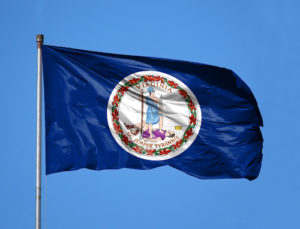 Virginia: A lawsuit filed against the Buckingham County Electoral Board has been dismissed. Board of Supervisors member Jordan Miles said the current interim registrar provided most of what he had asked for. But in some cases, that meant he received nothing as they didn’t have the requested files on record. “While the responses to my requests could be considered insufficient, I want to put this suit behind us to afford the Electoral Board the time and energy it needs to be fully prepared for the November election and stabilize itself and its operations, all of which are essential to democracy in Buckingham County,” Miles said. Miles had filed suit against the board and the registrar’s office in May arguing that they have violated state law in multiple ways.
Virginia: A lawsuit filed against the Buckingham County Electoral Board has been dismissed. Board of Supervisors member Jordan Miles said the current interim registrar provided most of what he had asked for. But in some cases, that meant he received nothing as they didn’t have the requested files on record. “While the responses to my requests could be considered insufficient, I want to put this suit behind us to afford the Electoral Board the time and energy it needs to be fully prepared for the November election and stabilize itself and its operations, all of which are essential to democracy in Buckingham County,” Miles said. Miles had filed suit against the board and the registrar’s office in May arguing that they have violated state law in multiple ways.
 Wisconsin: Michael Miecielica was found guilty but not guilty by reason of mental disease or defect on three counts for threats against election workers to halt the fall 2022 general election poll site at the West Bend Community Memorial Library. The three counts included one Class I felony, make use of or threaten force, violence or restraint to compel voting or refrain from voting, and two Class B misdemeanors, both for disorderly conduct, according to court documents. Miecielica had one other felony charge, a Class I felony for making terrorist threats, and 14 misdemeanor charges, related to the incident at the polling location and for posting notes containing vulgar language and threats against political candidates in the 2022 fall election on downtown West Bend-area businesses and a school, read in but dismissed. The misdemeanors included seven Class A misdemeanors, one for endanger safety/use/dangerous weapon, one for criminal damage to property and five for bail jumping, and seven Class B misdemeanors, five for disorderly conduct and two for computer message-threaten/obscenity, according to court documents.
Wisconsin: Michael Miecielica was found guilty but not guilty by reason of mental disease or defect on three counts for threats against election workers to halt the fall 2022 general election poll site at the West Bend Community Memorial Library. The three counts included one Class I felony, make use of or threaten force, violence or restraint to compel voting or refrain from voting, and two Class B misdemeanors, both for disorderly conduct, according to court documents. Miecielica had one other felony charge, a Class I felony for making terrorist threats, and 14 misdemeanor charges, related to the incident at the polling location and for posting notes containing vulgar language and threats against political candidates in the 2022 fall election on downtown West Bend-area businesses and a school, read in but dismissed. The misdemeanors included seven Class A misdemeanors, one for endanger safety/use/dangerous weapon, one for criminal damage to property and five for bail jumping, and seven Class B misdemeanors, five for disorderly conduct and two for computer message-threaten/obscenity, according to court documents.
Opinions This Week
National Opinions: Voting equipment | Election integrity | U.S. Supreme Court | ERIC | Voting Rights Act | Social media
Arizona: Election officials
Connecticut: Jail voting | Early voting
District of Columbia: Congressional hearing
Kentucky: ERIC
Maine: Secretary of state
Michigan: Election funding
Nebraska: Voter ID
Nevada: Election workers
North Carolina: Election legislation, II
Ohio: Secretary of state| Ballot measures | Special election costs
Pennsylvania: Runoffs
Texas: Vote by mail | Harris County | Election legislation
Virginia: Voting rights | Secret ballot
West Virginia: Election integrity
Upcoming Events
State Certification Testing of Election Systems National Conference: This year’s State Certification Testing of Election Systems National Conference (SCTESNC), hosted by Pro V&V, Inc., will be held at Huntsville Marriott at the U.S. Space and Rocket Center. The purpose of the conference is to share ideas and solutions for ensuring voting and election system reliability, transparency, and integrity through better testing of systems. The 2023 conference will feature a panel discussion on risk-limiting audits by leading national experts in the field. The primary goal of the conference is to provide a venue for practitioners and academics to share best practices for voting system testing and management, to explore more efficient and effective methods for testing and implementing voting and election systems, and to identify common challenges and potential mitigation to those challenges. Additionally, the conference is meant to be a vehicle to improve the flow of information between the federal, state, county, and municipality testing entities. This is a working conference with expectations that all attendees prepare a paper, presentation, panel discussion, or other activity to share ideas and innovations in the testing of voting and election systems. First-time attendees may waive the paper presentation requirements. This year, in lieu of an overarching theme, the conference organizers invite those attending to submit proposed topic presentations on any issue of importance related to the certification and testing of election systems. Attendance is open for all individuals engaged in the testing and certification of voting and election systems for government jurisdictions. When: June 12-13. Where: Huntsville, Alabama
U.S. House Committee Hearing: Committee on House Administration will hold a full committee hearing titled, “American Confidence in Elections Act: The Role of the Election Assistance Commission in Free, Fair, and Secure Elections.” When: June 14, 10:15am. Where: Washington, DC.
iGO Annual Conference: The International Association of Government Officials will hold its 2023 Annual Meeting in Fort Worth, Texas this year. In addition to an education grid, there will be numerous other events such as committee meetings, a trade show, learning sessions, receptions and fun activities. When: June 24-27. Where: Fort Worth, Texas
NASS 2023 Summer Conference: The National Association of Secretaries of State will hold its summer conference in Washington, D.C. Registration will be open in May. Check back for more details. When: July 9-12. Where: Washington, DC.
2023 EAC Local Leadership Council Annual Meeting: The U.S. Election Assistance Commission (EAC) Local Leadership Council (LLC) will hold its 2023 Annual Meeting on July 20th and July 21st. This meeting is in-person and open to the public. During the meeting, the EAC’s LLC members will discuss EAC updates and upcoming programs, such as election technology. The meeting will include moderated discussion on topics such as training and workforce development, looking ahead to 2024, and making the Local Leadership Council an effective Advisory Board. Throughout the meeting, there will be opportunities for members to ask questions. Additionally, the Board will vote to elect members to executive officer positions, who will be sworn in at the meeting. As leaders and officials who work firsthand to administer elections at the local level, the LLC provides recommendations and direct feedback to the EAC on a range of topics such as voter registration, voting system user practices, ballot administration (programming, printing, and logistics), processing, accounting, canvassing, chain of custody, certifying results, and auditing. The EAC appoints two members from each state to the 100-member LLC after soliciting nominations from each state’s election official professional association. Members of this advisory board, which was established in June 2021, must be serving or have previously served in a leadership role in a state election official professional association when appointed. The LLC currently comprises 90 appointed members. When: July 20-21. Where: New York City.
NACo Annual Conference: The National Association of Counties (NACo) Annual Conference & Expo is the largest meeting of county elected and appointed officials from across the country. Participants from counties of all sizes come together to shape NACo’s federal policy agenda, share proven practices and strengthen knowledge networks to help improve residents’ lives and the efficiency of county government. When: July 21-24. Where: Travis County, Texas.
Election Center National Conference: The National Association of Election Officials (The Election Center) will hold its 38th Annual Conference in Orlando, Florida in late August. In addition to the conference, CERA courses and renewal courses will be offered. Check back for more information. When: Aug. 26-30. Where: Orlando, Florida
Job Postings This Week
electionlineWeekly publishes election administration job postings each week as a free service to our readers. To have your job listed in the newsletter, please send a copy of the job description, including a web link to mmoretti@electionline.org. Job postings must be received by 5pm on Wednesday in order to appear in the Thursday newsletter. Listings will run for three weeks or till the deadline listed in the posting.
Assistant Manager-Poll Worker Department, Palm Beach County, Florida— The Palm Beach County Supervisor of Elections is looking for an experienced Assistant Poll Worker Department Manager. In this role, you will oversee the planning and the completion of various projects, administrative functions, operations, and specialized tasks in the Poll Worker Department. The work involves knowledge and application of departmental operations, planning, assigning responsibilities, monitoring election worker classes, maintaining records, evaluating performance, and the ability to review work for accuracy. This position requires initiative and sound independent judgement in the application of office policies, election laws, and procedures. Must be personable and maintain effective working relationships with colleagues, associates, and the general public. All work is performed under the guidance of the Supervisor of Elections. The ideal candidate will have an excellent work ethic, including consistent performance, reliability, and attendance. The desire and ability to work well in a fast-paced collaborative environment with a smile are essential to the position. Application: For the complete job listing and to apply, click here.
Associate Director, Political Science, MIT Election Data and Science Lab— To serve in a leadership role by working with the faculty director to develop and implement an expanded strategic vision of MEDSL and to manage operations and administration of the lab’s activities. Will bear primary responsibility for ensuring that the lab’s activities are responsive to the most pressing needs of election administrators throughout the United States and for maintaining robust lines of communication with election officials and allied research institutions. MEDSL is dedicated to the creation of knowledge, insights, and data necessary to increase understanding and guide improvement of elections as they are conducted in the United States. Required: bachelor’s degree; five years’ direct experience working in election administration or election science (which may have been acquired through work as a state or local administrator, leader of a nonprofit organization, or academic researcher); tactical and strategic approach to responsibilities; excellent problem-solving, organizational, project management, and written and verbal communication and presentation skills; organizational and cultural awareness; diplomacy and good judgment; initiative; interest in contributing to the progress of scientific research by facilitating the work of others; discretion and judgment with confidential information/issues; and proficiency with Microsoft Word, Excel, and PowerPoint. Must be able to achieve big picture results while paying attention to detail; follow through and achieve objectives in a timely manner; keep teams, projects, and deliverables on track; coordinate multiple tasks, set priorities, deliver results, and meet deadlines; exert influence, negotiate, and work across boundaries; and work independently and collaboratively. Preferred: graduate degree in law, political science, public policy, public administration, management, or related field. Application: For the complete job listing and to apply, click here.
Board of Elections Training Specialist, Wake County, North Carolina— Are you looking to get involved in your community? Do you want to make a difference? Are you passionate about learning? If so, get ready to roll up your sleeves and become part of something bigger! The Wake County Board of Elections is currently seeking an experienced Instructional Designer/Training Specialist to join our dynamic and driven Training Team. The ideal candidate will be a strong communicator who thrives in a fast paced, ever changing work environment. They will have a clear understanding of the commonly accepted instructional design models, what it takes to be a behind the scenes designer, have a strong visual sense and excellent project management skills. What will you do as a Board of Elections Training Specialist? Develop training materials, including classroom presentations, manuals, workbooks, training videos and online training modules to facilitate comprehensive training for Early Voting and Election Day Officials; Review, evaluate and modify existing and proposed programs and recommend changes; Create schedules, design layouts for training facilities and adjust room layouts as necessary between in-person classes; Train and manage instructors and assistants for in-person training classes; Serve as instructor for some online webinars and in-person classes; Collaborate with team members to gain knowledge of work processes, identify training needs and establish plans to address the needs through training solutions; Identify innovative training tools and methods to enhance the training program; Monitor and assess election law changes and incorporate the changes into polling place procedures; Develop and design election forms, precinct official website, newsletters, assessments and other communications; Develop high level design documents, storyboards, audio narration scripts, status reporting, QA and testing plans; Assists with Early Voting site setups and call center support; Assists with Election Day call center support and post-election processes; and Portfolios will be required by all applicants who are selected to move forward in the recruitment process. Salary: $27.10 – $28.10. Application: For the complete listing and to apply, click here.
Chief Deputy Registrar of Voters, San Bernardino, California— The San Bernardino County Registrar of Voters seeks a dynamic and innovative administrator who can lead and thrive in a fast-paced environment to manage our elections programs, processes, and team. The Chief Deputy Registrar of Voters is a forward-thinking individual that assists with guiding the future direction of the department and its processes, taking a hands-on approach to find solutions while working collaboratively with a knowledgeable and dedicated team. The Chief Deputy Registrar of Voters is a key member of the Department’s senior management team, participating in organizational strategic planning and administering election programs. The position serves as a Chief over a division of the Registrar of Voters (ROV) office and has primary responsibility for assisting the ROV in planning, conducting, and certifying all Primary, General, and Special elections. Salary: $85,425.60 – $118,684.80. Application: For the complete job listing and to apply, click here.
Chief Information Officer, Illinois State Board of Elections— Functions as Chief Information Officer (CIO) of the SBE Information Technology Systems. Responsibilities encompass full range of information services; application design and development, system administration, data administration, operations, production control, and data communications. In conjunction with the Board, Executive Director, and Executive staff, the CIO determines the role of information systems in achieving Board goals. Defines goals in terms of statutory obligations to be met, problems to be solved, and/or opportunities that can be realized through the application of computerized information systems. Prepares and submits budget based projections of hardware, software, staff and other resource needs to adequately provide for existing systems, as well as support of new project initiatives. Advises Executive Staff in matters relating to information technology. Develops presentations and reports for the Board and Administrative Staff. In conjunction with Executive Staff, evaluates system performance to determine appropriate enhancements. Salary: $7,885 – $13,237 Monthly. Application: For the complete job listing and to apply, click here.
Deputy Director- Communications & Support Services, DeKalb County, Georgia— The following duties are normal for this classification. The omission of specific statements of the duties does not exclude them from the classification if the work is similar, related, or a logical assignment for this classification. Other duties may be required and assigned. Manages, directs, and evaluates assigned staff; oversees employee work schedules to ensure adequate coverage and control; reviews timesheets; approves/processes employee concerns and problems and counsels or disciplines as appropriate; assists with or completes employee performance appraisals; directs work; acts as a liaison between employees and County administrators and elected officials; and trains staff in operations, policies, and procedures. Organizes, prioritizes, and assigns work; prioritizes and schedules work activities in order to meet objectives; ensures that subordinates have the proper resources needed to complete the assigned work; monitors status of work in progress and inspects completed work; consults with assigned staff to assist with complex/problem situations and provide technical expertise; provides progress and activity reports to County administrators and elected officials; and assists with the revision of procedure manuals as appropriate. Directs functions and activities of the department; directs voter registration programs, voter education and outreach programs; administers elections; recruits and trains poll workers; and oversees storage, maintenance, preparation, and testing of election equipment. Directs voter registration activities; reviews and approves staffing levels during high volume and peak registration periods; monitors work activities to ensure timely processing of applications and maintenance of voter registration rolls; and conducts voter education seminars and training for citizens. Conducts elections; supervises departmental personnel to ensure that all elections are conducted in accordance with state and federal laws and regulations; determines locations and schedule for early voting; organizes equipment and staff deployment levels for early and election day voting; reviews training packets; monitors early voting traffic and election task lists; approves ballot layouts; and implements changes in procedures to resolve issues. Plans, directs, trains, and supervises voter outreach activities; processing absentee ballots; receives/files nomination papers, candidate statements and initiative petitions; maintains the voter file; advises individuals/groups on procedures for filing initiatives, referendums and recall petitions; and files/audits campaign financial statements. Coordinates the daily operation of the department’s computer systems; supervises data entry of affidavits of registration; maintains election district information; prepares and maintains precinct maps; creating and consolidates precincts, including the operation of customized computer aided drafting applications; supervises election night ballot tabulating. Plans, directs and supervises employees engaged in securing polling places and precinct officers; training precinct officers; orders and delivers precinct supplies and materials; operating collection centers; conducting official canvass of election returns; operates mailing and computerized mail addressing equipment; mails sample ballots and election information to voters; and receives, inventorying and storing election supplies Assists in developing and implementing long- and short-term plans, goals, and objectives for the department; evaluates effectiveness and efficiency of department activities; reviews and revises policies, procedures, plans and programs; and researches, assesses, and makes recommendations regarding strategies to meet current and future election and voter registration needs. Interprets, applies, and ensures compliance with all applicable codes, laws, rules, regulations, standards, policies and procedures; initiates any actions necessary to correct deviations or violations; maintains a comprehensive, current knowledge of applicable laws/regulations and pending legislation that may impact department operations; and maintains an awareness of new products, methods, trends and advances in the profession. Assists in developing, implementing, and administering department budget; monitors expenditures for adherence to established budgetary parameters; and prepares and submits financial documentation. Oversees equipment and supplies for the department; determines voting equipment needs for each precinct for elections; monitors the packing and preparation of voting equipment and supplies; reviews and approves supply and equipment requisitions; develops equipment specifications; obtains price quotes from vendors; prepares and updates policies and procedures for equipment storage; and manages the maintenance of all related records. Completes data entry and filing; enters new voter registration information; verifies accuracy and completeness of voter information; conducts research of state records; mails out letters to retrieve missing information and documentation; updates existing records in statewide registration base; files new, updates existing, and pulls deleted cards as appropriate; scans and indexes registration and absentee applications; and files records and correspondence after processing. Oversees the creation of print and online content to publicize and promote department programs, facilities, events, or objectives; researches and verifies information; reviews, approves, or produces newsletters, calendars, brochures, and flyers; monitors, approves, and creates content for social media and department website; and writes or edits official department announcements, emails blasts, press releases, letters, or posts. Directs the design, planning and implementation of training programs aligned with department objectives and strategies; oversees community outreach programs and events; plans, organizes, and oversees special events, facility tours, educational programs; oversees the selection of locations, dates; reviews activities and materials prepared by staff or vendors; recruits and supervises event volunteers; and coordinates set-up, staffing, and implementation of program/event plans. Represents department to media, other departments, municipalities, candidates and state officials; answers questions and provides information; coordinates work activities; reviews status of work; resolves problems; responds to media requests; gives interviews and official comments; and produces short television segments for DeKalb County TV. Salary range: $81,077 – $125,670. Application: For the complete job listing and to apply, click here.
Director of Elections/General Registrar, Fairfax City, Virginia— The General Registrar is a department head and manages two full time employees, a team of temporary staff, and 60-100 elections officers. He/she is responsible for Voter Registration, candidate filing, campaign finance, and Election Management, including security protocols. The Registrar must perform the duties outlined in Virginia Code Sec. 24.2-114 to include timely processing of registration applications and maintaining accurate and current registration records, assuring compliance with all laws and regulations regarding voter registration and especially overseeing the registration process including eligibility determination and denial notification process in accordance with Department of Elections Guidelines. Elections management duties are carried out at the direction of the Electoral Board and include the maintenance, preparation, testing and deployment of the voting machines. Assuring the availability of the polling places; posting of precinct signs and preparation of election materials for the polling places. Assisting the Electoral Board to insure the uniformity, legality, and accuracy of elections. The General Registrar is required to manage all personnel, fiscal and physical resources as needed to provide all required and desired services of the office. Develop and administer a public information program to encourage registration and voting. Deal with inquiries and complaints from the general public and be a capable public leader. Must have the ability to establish effective working relationships with employees, City officials and the general public. Responsible for officer of elections training and preparation to include duties as a primary trainer of officers of election. The duties listed above are intended only as an illustration of the various types of work that may be performed. The omission of specific statements of duties does not exclude them from the position if the work is similar, related, or a logical assignment to the position. Salary: $148,293 – $182,392. Deadline June 30. Application: For the complete job listing and to apply, click here.
Division Director, Illinois State Board of Elections— Subject to Executive Director approval; oversees the administration of human resource programs including, but not limited to, compensation, payroll, benefits, and leave; disciplinary matters; disputes and investigations; performance and talent management; productivity, recognition, and morale; occupational health and safety; and training and development. Serves as the Board’s subject matter expert relating to personnel and human resource matters. Identifies staffing and recruiting needs; develops and executes best practices for hiring and talent management. Conducts research and analysis of Board trends including review of reports and metrics from human resource information systems. Recommends, implements, and ensures compliance with agency policies and procedures including, but not limited to, hiring, disciplinary actions, employee grievances, compensation plan, and employee performance evaluations. Creates and oversees human resource practices, programs, and objectives that provide for an employee-oriented culture that emphasizes collaboration, innovation, creativity, and knowledge transfer within a diverse team. Oversees the day-to-day administrative aspects of the Board’s personnel programs; accuracy of bi-monthly payrolls; benefits; quarterly and annual EEO/AA reporting; and, employee transaction documentation. Facilitates professional development, training, and certification activities for staff; development and maintenance of agency-wide training programs for on-boarding, staff development, and knowledge transfer. Responsible for the administration and oversight over all disciplinary matters; including: investigation of complaints; conducting witness interviews; documentation gathering; drafting and submittal of investigation findings to Executive Staff; advising Division Directors and Executive Staff on disciplinary matters; and, drafting of formal disciplinary reprimands in accordance with policy. Has administrative oversight of the Chief Fiscal Officer regarding budgetary and fiscal matters under the purview of the Division of Administrative Services. Supervises and evaluates subordinate staff; facilitates knowledge transfers and cross trainings; performs other duties as required or assigned which are reasonably within the scope of the duties enumerated above. Salary: $6,023.00 – $12,374.00 Monthly. Application: For the complete job listing and to apply, click here.
Election Director, Ohio Secretary of State’s Office— The Ohio Secretary of State Elections Division is recruiting for a Director of the Elections Division. The Director of the Elections Division (often called the Elections Director) oversees a team responsible for one of the Office’s two main functions: the oversight of local, state, and federal elections. The director serves as the Office’s primary liaison to Ohio’s 88 county boards of elections and, under the general direction of the Chief of Staff, leads the strategic planning and daily management of the division, including the following duties: Supervises division employees, including the enforcement of workplace policies, periodic review of performance, and recommendations for compensation and promotion; Oversees the issuance of advisories and directives that inform boards of changes to state election laws and sets uniform standards and policies by which elections are conducted; Develops and executes a detailed plan to manage the division’s work product in support of all timelines and deadlines associated with the annual elections calendar; Helps to develop and administer the division’s operational budget to ensure adequate levels of statewide support for the Office’s objectives; Provides daily support to boards of elections, including troubleshooting and training, as well as assistance as needed with administrative functions such as voting operations, poll worker recruitment, records processing and retention, post-election auditing, budgeting, legal compliance, and all other expectations established in the Secretary of State’s Election Official Manual; Reviews feedback from the Office’s regional operations teams and provides follow-up and support as needed; Determines the forms of ballots, poll books, voter instruction notices, and other forms relevant to the administration of elections; Oversees the collection, organization and review of statewide initiative and referendum petitions; Coordinates the meetings and direction of the Ohio Board of Voting Machine Examiners and the Ohio Ballot Board; Assists in the development and implementation of election-related public policy; Supports the Office’s legal staff in fulfilling public records requests, addressing litigation, and supporting law enforcement inquiries; Frequently briefs the Secretary of State and Chief of Staff on all relevant developments impacting the administration of elections in Ohio; Advises on vendor and consultant contracts; Assists the Office’s Information Technology team with election data retention and analysis efforts, including maintenance of voter registration records, investigations of fraud and irregularities, and publication of election statistics; Communicates with advocacy groups and election officials seeking guidance on the Office’s directives, advisories, or strategic policy initiatives; Represents the Secretary of State as needed in meetings, hearings, conferences, and other functions related to election administration; Seeks opportunities to strengthen the influence and visibility of the Office with election officials, advocacy groups, and influencers; Assists with the development of the Office’s communication content to intergovernmental contacts and third-party stakeholders; Manages the logistical planning and execution of the Office’s statewide Election Night Reporting operation, which includes the collection, tracking, tabulation, and reporting of election data from boards of elections to an official website for public consumption; Assists the Office’s legal staff in ensuring compliance with applicable rules, disclosures, and filings relating to lobbying and ethics laws; Collaborates with the Office’s External Affairs, Business Services, and Public Integrity divisions to support their respective objectives, including the development of public voter awareness campaigns, informational publications, website content, and other communications content; and Otherwise supports the Secretary of State and the Office of the Secretary of State in complying with all statutory obligations set forth under Ohio Revised Code Section 3501.05, “Election duties of secretary of state.” Salary: $125K-$140K. Application: For the complete job listing and to apply, click here.
Information Technology Security Analyst, Illinois State Board of Elections — The IT Security Analyst reports directly to the Manager of Cyber Operations and Infrastructure. Supports the administration, implementation, review, and improvement of endpoint, network, hardware, application, and data security practices. Implements, supports and monitors the agency’s information security applications, including email security, web security, endpoint security software, firewalls, intrusion prevention applications, data loss prevention, etc. Monitors system dashboards and logs for threat indicators. Analyzes data and performs necessary incident response procedures. Conducts network, system and application vulnerability assessments. Analyzes agency threat surface and makes recommendations to management to harden agency systems. Evaluates agency processes and implements and/or makes recommendations to enhance security. Reviews information received concerning threat events from end users, supervisory personnel, other federal, state, county and local agencies and governmental entities involved in the exchange of data with the State Board of Elections (SBE), external entities such as the Multi-State Information Sharing and Analysis Center (MS-ISAC), Elections Infrastructure Information Sharing and Analysis Center (EI-ISAC), trusted cybersecurity vendors, law enforcement agencies, and public information sources. Consults with SBE staff on security issues. Provides a high level of customer service to agency staff, state, county, and local election officials. Ensures service desk queues and incidents are handled in an appropriate and timely manner. Salary: $6,264 – $8,917 Monthly. Application: For the complete job listing and to apply, click here.
Legal and Electoral Dispute Resolution Expert, The Carter Center— The Democracy Program at The Carter Center works globally to support and strengthen participatory democracy, consistent with human rights. Beginning in 2020, The Carter Center began efforts to support elections in the United States. There are multiple key aspects to this project: establishing nonpartisan observation efforts, bolstering the electoral dispute resolution process, tracking disinformation and dangerous speech, contributing to electoral reform, and promoting a set of candidate principles for trusted elections. The Carter Center’s proposed electoral dispute resolution program aims to bolster public awareness of existing mechanisms to resolve electoral challenges as a means of building confidence in the process and encouraging peaceful acceptance of results. It also seeks to identify and propose meaningful reforms to strengthen those mechanisms and make them more coherent. Ahead of the 2024 election cycle, The Carter Center is proposing a four-pronged program of work that to increase the transparency, accessibility, timeliness and accountability of electoral dispute resolution mechanisms and thereby bolster public trust in the electoral process. The program will seek to both raise awareness of existing mechanisms for electoral dispute resolution and provide recommendations for their improvement. This position will also serve as our legal expert and will work closely with other members of the US Electoral expert team to assess the extent to which the US legislation, state legislation, and their implementation complies with international election standards. The legal analyst is expected to understand the legal framework of elections in the United States, generally, brief staff on election-related legal issues, and meet with relevant stakeholders as requested. Salary: Commensurate with experience Length of Assignment: Through August 31, 2023, with possibility of extension or contract renewal. Application: For the complete job listing and to apply, click here.
Operations Associate, NASED— This position is part-time and fully remote, but the candidate must live in the United States. Travel to support NASED’s Winter and Summer conferences is required (approximately 10 days per year). This position reports to NASED’s Executive Director. This role does not supervise any staff. A part-time (approximately 20 hours per week), fully remote, Operations Associate for a small nonpartisan, nonprofit membership association. Reporting to the Executive Director, this new role will support all the organization’s operational needs. The responsibilities of this position will include, but are not limited to, the following: Help update and maintain website content; Help maintain NASED’s social media presence, including developing content and creating basic graphics; Work with NASED’s controller on monthly financial reports and with the auditor and accountant on annual reports and filings; Monitor and assist with responses to inquiries sent to NASED’s shared inboxes; Maintain organization distribution lists; Assist with scheduling Board and Committee meetings; Assist with conference planning, including developing the conference website via the conference management platform, creating and proofing materials, planning activities, and budgeting; Support the execution of two national conferences per year; Create and send annual invoices to organization members and Corporate Affiliate members; Other duties and special projects as assigned. Application: For the complete job listing and to apply, click here.
Policy Associate, National Conference of State Legislatures— NCSL’s Redistricting and Elections program is looking for a dynamic and flexible Policy Associate with demonstrated competence in legislative research and analysis of state election issues, including election administration, restricting, campaign finance and other related policy areas. Specifically, the ideal candidate should be able to summarize and describe a policy issue or legislative trends and be able to identify credible resources. The Policy Associate may work on a variety of policy and legislative topics, contribute to a range of tasks and projects, and over time may deepen knowledge in a particular subject matter. This role will also contribute to meeting planning, webpage maintenance, and may have contact with legislators, legislative staff, and other officials, including virtual and in-person discussions or meetings. Work may be performed independently or as a member of our team. This position will operate largely in support of and at the direction of other staff but may have responsibility for assigned tasks. Salary: $53,955. Deadline: June 9. Application: For the complete job listing and to apply, click here.
Marketplace
electionline provides no guarantees as to the quality of the items being sold and the accuracy of the information provided about the sale items in the Marketplace. Ads are provided directly by sellers and are not verified by electionline. If you have an ad for Marketplace, please email it to: mmoretti@electionline.org